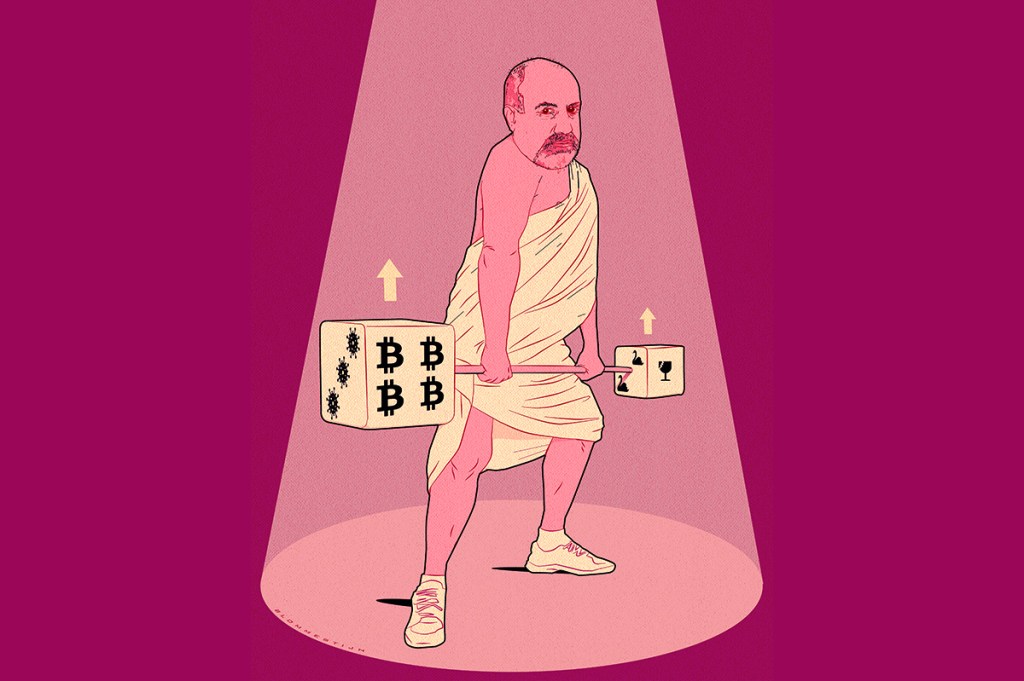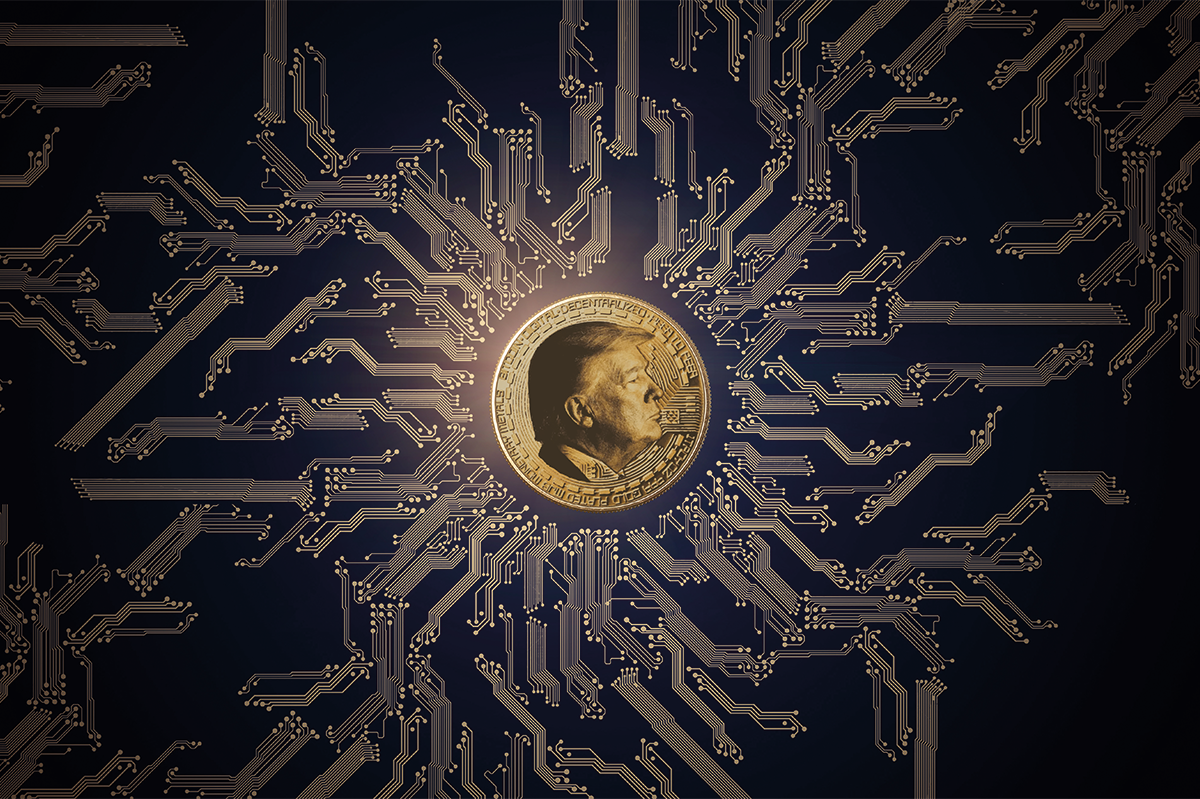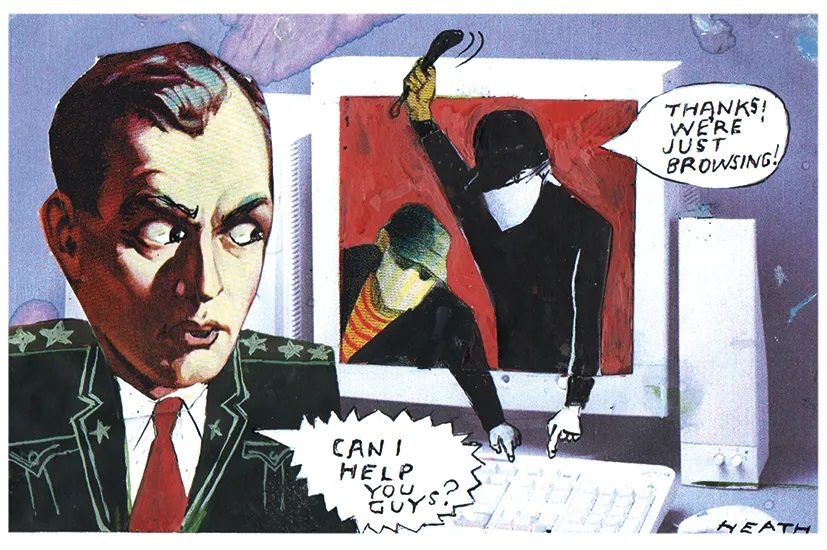Dealing with the writer, statistician, Twitter warrior and self-described flâneur Nassim Nicholas Taleb is no simple matter.
First there was the initial approach, months ago. I ventured to email him and ask for an interview despite his long-held and often-expressed low opinion of journalists. (Heuristic: those who make the biggest deal out of disliking the media care about it the most.) To my surprise, Taleb agreed to it almost immediately even though he “doesn’t do interviews.” Some logistical back and forth ensued. Then a twist: he would only agree to be interviewed if he wasn’t photographed. Why? Because in photos he is “made to look sickly and weak.” As evidence, he attached two blurry screenshots of his YouTube lectures as well as a professional media photo, to illustrate the contrast. I was apparently meant to see how sickly and weak he looked in the professional photo (he didn’t). Luckily, The Spectator is famous for its cartoons, so I could assure Taleb that no devious photographers would be involved.
There was a small window of time in which Taleb was in New York and available for lunch. I barely caught him after a Covid scare. Finally we did meet, at Bahari Estiatorio, a Greek restaurant in Astoria, Queens. It was a freezing day in December. Taleb wore a black turtleneck and brown corduroy jacket. I greeted him, sat down, and pulled out my phone, telling him I would now begin recording the interview. Taleb adopted a hushed tone and told me he didn’t think the restaurant would like it. I said I’d done any number of interviews in restaurants and never had a problem. He said he would rather “break the ice” and just have lunch, then do the real interview later. So we just had lunch. Taleb is in his element at lunch. He ordered lahanodolmades, cabbage leaves filled with rice and ground beef. He let me have the last bit because he could tell that I liked them, he said. In total we had four appetizers and two entrées, but no dessert, because in his opinion they’re “crap” and he will only eat Lebanese pastries. We talked about everything from Elon Musk to Charles Murray, to the Talmud, cryptocurrency and genetic haplogroups. Afterwards I got on the subway and Taleb got back into his Tesla. We would do the real interview later.
So I emailed him after the holidays to schedule it. But Taleb was traveling the whole month of January, and wouldn’t agree to a phone call. Why? Because an interview “requires a certain mood and concentration.” More back and forth. Finally a date was set — we could Zoom one morning in February. Clearly suboptimal, but I took the offer. Not all of us are globetrotting former traders who have the luxury of waiting for the right mood and concentration and never having to meet deadlines. Taleb got his start as an options trader in the 1980s and made what he has called “fuck-you money,” enabling him to quit his finance career and pursue a life of research and writing. Nowadays he splits his time between Atlanta, New York and his native Lebanon, is writing two new books called Principia and Entropy, travels frequently and owns people on Twitter.
I wanted to write about Taleb because, with the recent fall of crypto, he seemed especially relevant after twenty years serving as an antidote to the confidence men who offer certainties: here’s how to get rich; this new technology will change the world; take this supplement to live forever. Taleb is the anti-confidence man.
Starting with his 2001 book Fooled by Randomness, Taleb has an idea that should be basic, but that modern society finds difficult to accept: we don’t control everything. In fact, we control very little. Taleb expanded this into a five-book series called the “Incerto”: Fooled by Randomness, The Black Swan, Antifragile, The Bed of Procrustes and Skin in the Game. The books, a mixture of lifestyle and finance advice, aphorism and philosophical tract, expound on the outsize role of chance on every aspect of life, from dinner parties to macroeconomics. Instead of trying to predict everything, he argues, we should learn to live with uncertainty — even grow stronger from it, or “antifragile” in his parlance.
This insight has kept Taleb relevant over the past two bewildering decades. Though he first became prominent through the application of his ideas to the world of finance — 2007’s The Black Swan, on the impact of unforeseen events, was received as presaging the global financial crisis — more recent events like the pandemic and the rise and fall of crypto have piqued mainstream interest in the Talebian worldview. His books have been extremely influential to a staunch legion of fans for whom he’s as much a lifestyle influencer as a philosopher, the godfather of a hard-to-define but instantly recognizable subculture that, like Taleb himself, marries ancient wisdom with being very online.
On the appointed morning in February, Taleb appeared over Zoom from his home in Atlanta, wearing a lime-green cycling outfit and sitting in front of the chalkboard he uses for his Twitter videos. His studio lights and weightlifting equipment were out of frame. He’s big into cycling now, after decades advocating for short bursts of anaerobic exercise as the optimal form of working out, e.g. compound lifts such as deadlifts. Taleb had been busy. He had already published two papers since the new year, on statistical concepts that I asked him to explain to me as if I was five years old, to which he said, “you’re not five years old.”
Taleb gave something of a tutorial in how he operates. As curmudgeonly as he is, he’s willing to change his mind. “People don’t realize it, but I openly discuss my failures, my errors and go back and retract stuff,” Taleb said. The biggest recent example was his reversal on Bitcoin. “When I realized Bitcoin was wrong, I immediately voiced it,” he said. Which is why there were people [who] were actually very vicious with me and attacking me, after Bitcoin, because a lot of people were using me to prop up, you know, the scheme.” (He also cops to having been wrong on Vladimir Putin, hydroxychloroquine and the Syrian Civil War.) The point is not to never make a mistake, per the Talebian “skin in the game” concept; it is to own up to your mistakes and admit to them publicly. “With Bitcoin, I had some guilt because I made money with Bitcoin initially.” How much? He won’t say, but “it’s not insubstantial.” Taleb had also been quite public in his enthusiasm for crypto, endorsing a book by pro-Bitcoin influencer Saifedean Ammous. So after he changed his mind, he announced it in a 2021 paper declaring that the currency’s value was zero. He then made more money shorting it.
He had decided that the crypto world “combined a cult with a financial instrument” and attracted a cluster of computer people who didn’t understand finance. The blockchain? “Explain to me why you’d ever do business with somebody you don’t trust.” In his experience as a trader, the people who made the best traders were the “Fat Tony” types, often working class, short on formal education but long on street smarts. (This is possibly Taleb’s favorite archetype. Fat Tony, in the Incerto, is a fictional character who debates Socrates and embodies a kind of idealized yeoman folk wisdom.) The not-so-good traders were the technical math whizzes who lacked Fat Tony’s natural understanding of contingency and risk, and clung to rules and certainties. “You know, they want certainty, certainty, certainly trustless network and then you blow up the world because you want certainty here. OK. But then you create, you have all this uncertainty that you’re not capturing,” he said.
And the crypto bubble has in fact burst, most notably illustrated by the collapse of cryptocurrency exchange FTX last year and the indictment on fraud charges of its founder, Sam Bankman-Fried, who Taleb has called “as criminal as Bernie Madoff.” Bankman-Fried, who became a darling of the international elite and figurehead of “effective altruism” while allegedly scamming customers out of their money, is exactly the kind of person who triggers Taleb’s allergy to phoniness.
“He has a tremendous ability to see the opportunity for explaining things that people don’t understand,” says Yaneer Bar-Yam, a complex-systems scientist who sometimes collaborates with Taleb on research papers. “He realizes that there is this discrepancy between how people are thinking and how they should think.” Taleb wrote a paper in January 2020 with Bar-Yam and Joseph Norman warning of the dire systemic risks of the novel coronavirus. While most of us were aware of the virus mostly from a few scary Chinese videos, Taleb et al. argued that it would balloon out of control if governments didn’t act quickly. “Nassim was alert to what was happening in China,” Bar-Yam says, and they quickly drafted and published the paper. They both “knew the essential information, which is that we have to respond to this based upon an understanding of the extreme risk. Why? What makes a pandemic have this kind of risk? I’m quizzing you.” (I got it right: because the interconnectedness of people and systems make them vulnerable to contagious disease.)
“The main thing is that he’s really able to understand how to characterize the world on the one hand, but also how to engage in the battle of getting people to think differently,” says Bar-Yam. “That’s not easy.”
Ryan Faulkner-Hogg is someone who thinks differently because of Taleb. An Australian living in Stockholm, he got into Taleb’s work in 2018 or 2019 after seeing an investor he admires mention him in an interview, he says. Faulkner-Hogg picked up a copy of Fooled by Randomness and “was just compelled. I was completely sucked in.” He inhaled the rest of the Incerto over the course of the next two or three weeks. “I’d never heard anything like it before.” Taleb’s books made Faulkner-Hogg think deeply about the role of chance in his life — not just the slings and arrows of outrageous fortune, but serendipity as well. Chance, he realized, could be your friend.
Faulkner-Hogg came up with the idea of making a podcast devoted to explaining Taleb’s ideas in a very Talebian way. “His whole shtick about being a flâneur is that he has unscheduled time, you know, he takes a walk and sort of feeds into his instincts. If he feels like working, he works, if he doesn’t feel like working, he doesn’t.” So after a long walk, and a “sudden burst of creativity and energy,” Faulkner-Hogg decided to “roll the dice” and start the podcast. He has devoted longer episodes to explaining each book of the Incerto series as well as shorter ones to explore concepts he finds compelling — like “via negativa,” or “Extremistan and Mediocristan.” For a labor of love by someone with a full-time job — Faulkner-Hogg had to take an un-Talebian call from his boss while we were on the phone — it’s done pretty well, accruing 150,000 downloads. Sometimes fellow fans reach out. “Occasionally, I’ll get a photo from a guy in you know, like, France, or New York, and he’s always some sort of Fat Tony lookalike, it’s quite funny,” Faulkner-Hogg said.
Taleb is popular because he’s not selling anything; there’s no online course or paid subscription. What he offers is permission to look deep into the past for answers on how to live in the uncertain present.
It’s easy to spot a Taleb fan; tells include an enthusiasm for Stoic philosophers and weightlifting. “Many people randomly follow me on Twitter,” says his long-time friend Nadim Shehadi. “And I can immediately tell they’re Nassim Taleb followers, because on their Twitter bio it would say ‘flâneur.’” Faulkner-Hogg finds Taleb’s advice on diet and exercise the least compelling of his body of work, but those are the areas in which his ideas have perhaps had the most impact culturally. Take Paul Skallas, the antiquity-loving “Lindy Man,” a blogger and tweeter who has built his brand around Taleb’s concept of the Lindy effect (put simply, the older something is, the more likely it is to endure). Skallas dispenses health and lifestyle advice under the Lindy aegis, aiming his content at members of the “4HL” — the “four-hour life,” the amount of time Skallas estimates is left over daily for most people with office jobs. Taleb’s veneration of the ancient world resonates with a demographic who might feel left behind by the confusing demands of modernity.
I asked the historian Tom Holland, a specialist in the classical world and host of the podcast The Rest is History, whether Taleb himself is like the ancients he esteems. “You could imagine his face on one of the Fayum portraits, or the bust of a particularly contrarian, stimulating philosopher, perhaps in the first century BC,” says Holland. “I mean, yes, he very much seems a part of that world… the range of, the variety of his interests, I think, are true to that kind of sensibility.” The two got to know each other after Holland’s book on early Islam received a withering review from the historian Glen Bowersock, prompting a vigorous Taleb counterattack — “charging, like a kind of bull,” Holland said. Besieged, Holland was “incredibly grateful” to Taleb, who he felt “absolutely fixed on what I’d been trying to do in the book” and reframed the opprobrium of an academic like Bowersock as a plus, not a minus. (From Antifragile: “Criticism, for a book, is a truthful, unfaked badge of attention, signaling that it is not boring; and boring is the only very bad thing for a book.”) Holland and Taleb have remained friendly. “You feel you are in the presence of someone who is fabulously smart, and you’ve got to be on your toes,” Holland says.
It’s that sense — of not being able to get away with a so-so intellectual effort, of having to avoid the dreaded charge of “bullshitting” — that makes Taleb equal parts compelling and exhausting. No detail is too small. I asked Holland for any favorite Taleb stories (exactly the kind of journalistic anecdote-harvesting Taleb despises.) He mentioned a time they’d ended up in a “weird flat” in South London with the musician and producer Brian Eno, but said to check with Taleb since he couldn’t remember the details. I wrote to Taleb about it — with trepidation, since he’d accused me of bullshitting about a different issue just a few days before — adding, “Not sure it’ll fit into the piece anyway but wanted to check.”
“Actually relevant,” he replied within ten minutes. “It triggered the precautionary principle. Brian Eno wrote to me an open letter after that evening; my response was PP which led to a smear campaign by Monsanto. More on Tuesday in a podcast.”
Taleb is much more polite in person than his disputatious online persona. Years ago he was scheduled to debate Charles Murray, the controversial author of The Bell Curve, in Las Vegas, when he realized “he was not a statistician.” Bad news for Murray. But Taleb decided to spare him. “I negotiated for him a way out, just to be nice by talking about the other book on culture, whatever it was,” Taleb said. “And I found so many mistakes in his book. And I didn’t reveal them during the debate with him.” Was Murray thankful? No: “he started spreading rumors that I was rude and unbearable. It is true, only if I was but I was not.” Taleb later left a one-star review of Murray’s book on European culture on Amazon, delineating the errors he’d identified, under the title “Shockingly ignorant book full of elementary errors, absence of scholarship.”
He doesn’t like to let a point go. Shehadi, a scholar of the Middle East who first met Taleb when they were teenagers in Lebanon, describes five-hour drives spent arguing the whole way from Massachusetts to New York. But “you’d be surprised,” Shehadi says. “He’s one of the kindest people I’ve ever known.” Shehadi describes a time when Taleb nearly had to cancel an engagement to come speak to Shehadi’s students at Tufts, but made it work anyway, because “he said ‘if it’s the students, I will not disappoint them. But if it’s you I don’t give a damn.’ So he did come,” Shehadi says. “But he’s not a very social person, he’s good with one or two, three people, but he’s not a crowds person.” Is Taleb… actually kind of shy? “Possibly, yeah.”
This is the Taleb paradox: the courtly dialogist versus the mudslinger, the ancient thinker with a penchant for Twitter beefs. A few days before I interviewed him, he had been fighting there with someone called Dr. Eli David, who had made fun of Taleb for a photo from early in the pandemic of himself on a plane wearing two masks and a pair of ski goggles. “Quacks like ‘Dr’ Eli David, when confronted, prove they are quacks w/ the HINDSIGHT game: showing in 2023 information from first 1⁄2 of 2020 when we had no idea how the virus worked, no vaccines, no treatment, etc.,” Taleb shot back. “Followers are stupid enough to not understand the passage of time.”
“I have a program where twice a week I bust someone,” Taleb told me. “A condition is for the person to either be influential on Twitter or influential elsewhere. And that keeps the system in check. And I think that it’s vastly more effective than banning people.” David, a “Researcher, Lecturer, Entrepreneur & Investor” with 325,000 followers, had the misfortune to be the last guy Taleb selected to make an example of in his “anti-disinformation mission.”
But he is far from the only one. It was hard not to chuckle at Taleb’s campaign against the tech-bro influencer Lex Fridman, a popular podcaster who has built a large audience while touting a tenuous connection to the Massachusetts Institute of Technology. On New Year’s Eve, Fridman tweeted about his project to read a book a week in 2023. Can anyone really read The Brothers Karamazov in one week? It was instant Taleb bait that resulted in a viral thread that only got more brutal from here: “If you don’t get why, between 2019 and 2022, I turned down exactly 10 requests to be on his podcast, this will provide a succinct explanation.” Even the AI chatbot ChatGPT isn’t safe; it had the misfortune to provide him broken links to cycling maps in Atlanta.
Taleb described his carefully planned method for posting. “What people don’t realize is I have my Twitter fights prepared at least a week in advance,” he said. “And I use that downtime, traffic jam in an Uber or something like that, to start executing.” The offensive strike on Lex Fridman, Taleb said, “was prepared for years.” I thought about a post I’d seen on Reddit a few months before, by a user who claimed to have seen Taleb in an airport “glued to his phone like a teenage girl. I wonder if he was raving on Twitter.”
Would Seneca have done the same? Reading about the Roman Forum gives the sense that Taleb’s online-ness, like his worldview, does have roots in antiquity. Cato the Elder probably would have loved Twitter, too.
This article was originally published in The Spectator’s April 2023 World edition.

























